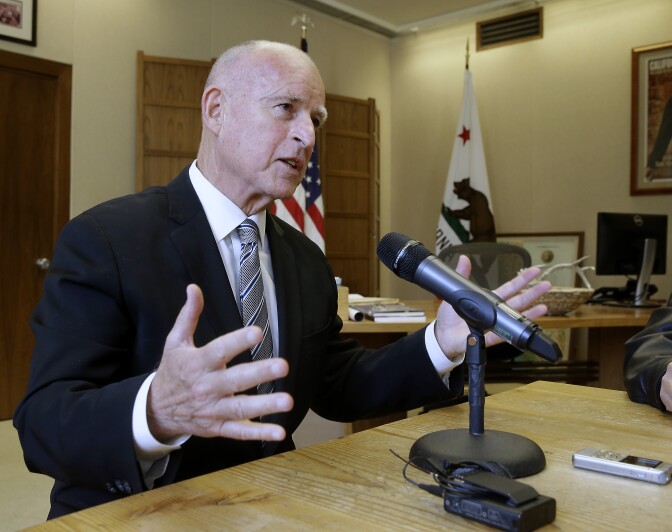This story is free to read because readers choose to support LAist. If you find value in independent local reporting, make a donation to power our newsroom today.
This archival content was originally written for and published on KPCC.org. Keep in mind that links and images may no longer work — and references may be outdated.
More than 50 housing advocates line up to oppose Gov. Brown's bill

Last month Governor Jerry Brown proposed a bill to shorten the time it takes developers to get a housing project off the ground. But today, about 50 housing advocates across the state announced their opposition to that idea, and said they'd fight to get lawmakers to reject it.
Brown's bill would aim to speed up residential development by reducing the amount of time developers spend soliciting and responding to community input. Developers would also be subject to less environmental review.
The Alliance for Community Transit - Los Angeles is one of the coalitions who joined with about 50 other advocates in a letter against the bill. Laura Raymond, campaign director for the ACT-LA said the bill would do just the opposite of what it intends to do.
“The premise of it is that it is going to be providing affordable housing, and (that the development of affordable housing) should be streamlined," she said. "But we could get a lot more affordable housing through a rigorous community engagement process."
Ben Metcalf, director of the California Department of Housing and Community Development defended Brown's bill using the basic rule of supply and demand. He said housing is too scarce in California, which means landlords can fetch high rents, and house hunters are forced into bidding wars when they try to buy homes. Since Brown's bill calls for streamlining the building process, it would incentivize developers to build more residential units, and that new supply would keep rents and housing prices stable, he said.
“What we see is that it takes much longer to actually get a project built and open it up for folks to call home, said Metcalf, describing the obstacles developers face. “And it ends up costing a lot more.”
Metcalf cited his own department's research on state-funded housing developments, which found that the reviews and community approval process added close to 12 percent more to the total cost of a project.
Raymond disagreed with that math, and argued that a streamlined process would cut out residents, especially people from working-class neighborhoods who would have even less input on a new development that they saw as problematic. They'd also have less pull in negotiating for affordable housing units or other resources associated with a new building, she said.
"To cut out (the community input process) is cutting out a community’s voice about what is being built in their neighborhood,” she said.
According to Michael Lens, professor of urban planning at UCLA, the tension between local and community-level organizations and the state government is hardly new.
“Whether you’re talking the city level or the neighborhood level, everybody wants to have control over development,” Lens said.
While some might expect a community engagement process to most benefit low-income residents, Lens said, his own research has found the opposite – historically, it has favored higher income communities. Other research has found that this process tends to lead to less development in general, he said.
“We do need to reduce the opposition that gets in the way of development in a lot of areas, but we absolutely do need to monitor this for equity reasons,” Lens said. “Are low-income communities going to fare better from these processes after a bill like this is enacted and enforced, or not?”
A Housing and Community Development official said the department and the governor’s office have received over 19 letters from supporters of the bill, including the LA County Business Federation, the California Association of Realtors, and Abundant Housing LA.
Brown's bill is part of larger housing package included in his budget, which must be passed by June 15.
ACT-LA said they will work with local and state groups to contact the governor’s office and policymakers to express opposition to the proposed bill.







